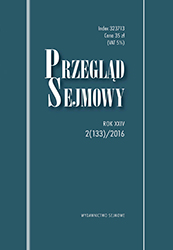Odmowa mianowania sędziów konstytucyjnych (casus Słowacji)
Refusal to Appoint Constitutional Judges: The Case of Slovakia
Author(s): Anna Chmielarz-Grochal, Jarosław SułkowskiSubject(s): Constitutional Law
Published by: Kancelaria Sejmu
Keywords: Constitutional Court; the appointment of judges; independence of the judiciary; constitutional judge; cooperation of the branches of government
Summary/Abstract: The procedure for appointing judges of the Constitutional Court in Slovakia does not differ significantly from the solutions adopted in other European countries. The Slovak model has similaritieswith the solutions adopted in 1991 in relation to the judges of the Constitutional Court of the Czechand Slovak Federal Republic. The procedure for appointing constitutional judges included — at theinitial stage — the entities involved in legal practice and study of law, whereas the creative powerwas de lege ferenda based on the cooperation between the National Council and the President of the Slovak Republic. Despite the involvement of various stakeholders, the appointment is de facto a politicalprocess, since the fi nal decisions are taken by political authorities. An important issue, whichconcerns the nomination of judges, is the scope of discretionary powers of the head of state in theassessment of candidates for appointment to judicial office. Given that the President appoints judgesfrom among candidates nominated at the request of the National Council, the we cannot accept theapproach limiting the role of the President of the Republic to that of the notary public devoid ofthe possibility of effecting membership of the constitutional court. Disputable is also the view expressed in the judgment of 17 March 2015 imposing on the President an absolute obligation to appoint a judge from among of the two candidates. The appointment of judges is the responsibilityof President of the Republic and is associated with its obligation to ensure continuous work of theconstitutional court. Continuity may be threatened not only if the President refuses to appoint in anarbitrary manner, but also when he appoints to the membership of the court persons whose activitiesmay interfere with its proper functioning. It is also hard to accept the idea that the head of state wouldhave the full impact on the process of nominating judges. The President cannot freely decide whowill be the judge, nor can he/she spontaneously assess whether the candidate meets the requirementof having appropriate work experience. Possessing a knowledge of law should be the subject of publicdebate, a kind of competition between the candidates, and not a tool by which the President mayreject the candidates nominated to him.
Journal: Przegląd Sejmowy
- Issue Year: 2016
- Issue No: 2
- Page Range: 29-46
- Page Count: 18
- Language: Polish

